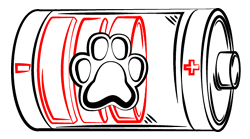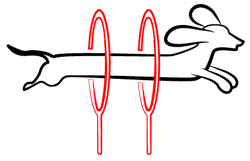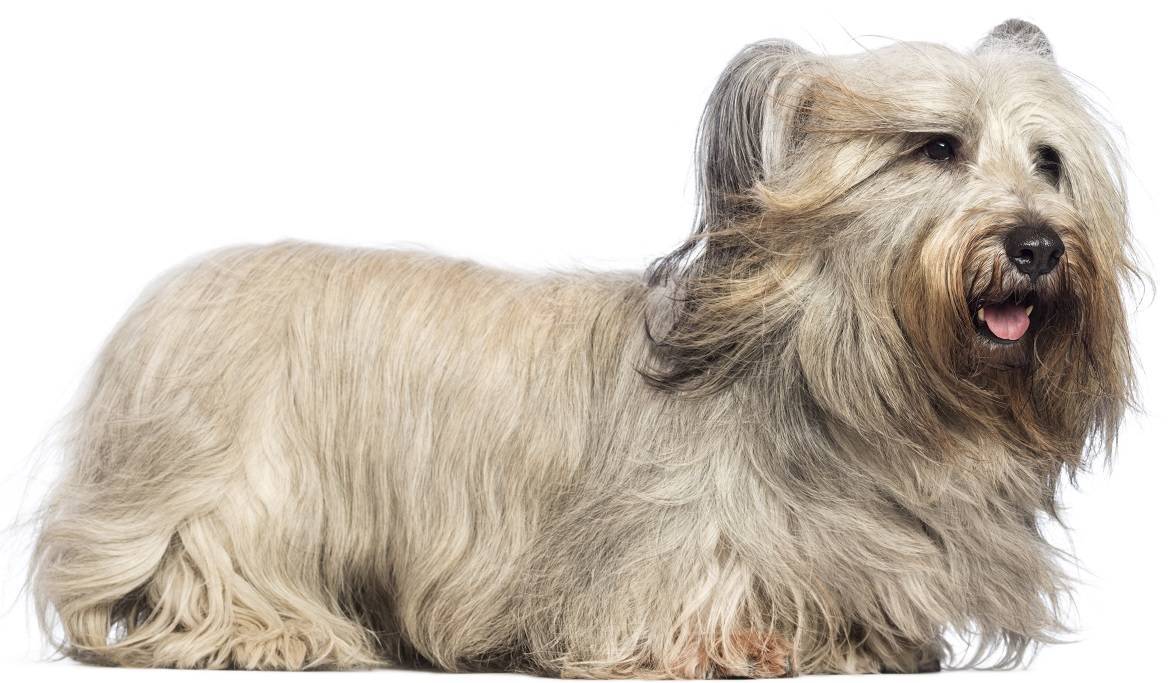
Paws ‘N’ Pups Quickview
Size
| Energy Level
| Trainability
| Paws ‘N’ Pups Rank
|
Characteristics
| Physical Characteristics: Height: 9-10” Weight: 25-40 lbs. Energy Level: Moderate | Colors: The American Kennel Club recognizes the Skye Terrier in the following colors:
|
Health & Longevity
Average Life Span: 12-14 years
The Skye Terrier is, for the most part, a very healthy breed. However, there are some potential health problems to consider.
Cancer is the leading cause of death among Skye Terriers, particularly breast cancer and spleen cancer, although it does not affect a large percentage of the breed.
Autoimmune diseases such as hypothyroidism or blood-clotting diseases may also affect Skye Terriers. Hypothyroidism is less serious than blood-clotting diseases and occurs when the thyroid gland does not produce sufficient hormones. This condition often results in infertility, obesity, hair loss, and lethargy, but it can be treated effectively with daily medication.
Hip dysplasia and patellar luxation are additional concerns. Hip dysplasia is when the thighbone does not fit properly into the hip joint, resulting in discomfort and potentially leading to arthritis. Patellar luxation is when the kneecap is easily dislocated, and the condition can cause lameness in severe cases.
Premature closure of growth plates in the front legs may occur if a Skye Terrier puppy does too much jumping or climbing before the plates have had adequate time to close properly. This will result in limping and pain. Monitor your Skye puppy’s playtime carefully to ensure he does not jump on hard surfaces or climb stairs. If you have stairs in your home, your Skye will need a ramp until he is nine months old.
Like all terriers, the Skye Terrier may suffer from allergies and itchy skin. Despite the potential for these health problems, the Skye Terrier has an average lifespan of 12-14 years.
Temperament & Train-ability
The Skye Terrier is more serious than the average terrier and is known for being elegant and dignified. He is extremely loyal to his family and often forms a particularly strong attachment to one person. He is a proud dog, so he may be headstrong and stubborn at times. He is protective of his family and makes a good watchdog who is sure to sound the alarm if he senses approaching danger.
Although the Skye Terrier does enjoy outdoor activities, he prefers to be a house dog. He is calm and typically well-behaved indoors, although he may bark frequently, especially if not trained properly or if left alone for long periods of time. The Skye Terrier requires a lot of attention and prefers to be in the company of his family as often as possible. A neglected Skye Terrier will become a very unhappy dog. Because he does not have strenuous exercise requirements, a Skye Terrier can live in an apartment, as long as he gets daily playtime and short walks. Some Skye Terriers can even get enough exercise simply by moving from room to room, but they should not be stuck indoors all the time.
Older children make good companions for Skye Terriers, but they are not always a good choice for families with small children, who may not respect the Skye Terrier’s space, food, and possessions. This breed can get defensive, and they have low tolerance for foolishness. Skye Terriers initially react to strangers with caution. Early socialization is important to prevent your Skye Terrier from becoming outright fearful of unfamiliar people. The Skye Terrier can typically get along with dogs he lives with, but he does try to dominate strange dogs of the same sex. He is not good with cats or other small pets; he has a strong chasing instinct and will pursue and attack them. This chasing instinct makes a leash or a secure fence essential when your Skye Terrier is outdoors.
Stubbornness can make a Skye Terrier somewhat difficult to train, although they are intelligent and willing to learn. You must be firm and dominant without being overly harsh. Like most terriers, the Skye Terrier is likely to growl and snap if he believes you are treating him unfairly. At the same time, he may not respect a family member who is not a firm leader. If you speak to your Skye Terrier with a firm voice and clearly, consistently establish rules and guidelines, he will love and respect you. Positive reinforcement like praise, favorite treats, and playtime can go a long way in training a Skye Terrier. Keep training sessions short and varied to prevent boredom. Also be sure to socialize your dog from a young age in order to prevent timidity with strangers and over aggression with other dogs.
Grooming
Skye Terriers have long, flowing coats that should be brushed weekly with a pin brush or long-toothed comb to prevent the coat from becoming matted and to reduce shedding. Skye Terriers are average shedders, so be prepared to do a bit of vacuuming on occasion.
Bathe your dog every two to three weeks because their long coats can easily pick up dirt and dust. It is recommended that you pull shampoo through the Skye Terrier’s coat instead of scrubbing, as their coat can tangle easily.
Trim your dog’s nails as needed, and be sure to check ears for signs of infection like redness, tenderness, and odor. You should brush your Skye Terrier’s teeth at least two or three times weekly, but brushing them daily is even better.
Diet
A Skye Terrier should eat about 1 3/8 -1 7/8 cups of high quality dog food daily. The best amount and type of food for your individual pet depends on factors like age, gender, metabolism, activity level, and size. You should divide your Skye Terrier’s food into two smaller meals to prevent overeating.
Ensure that your dog always has access to clean, fresh drinking water.
Looking for a Skye Terrier?
 Find A Skye Terrier Breeder |  Skye Terrier Puppies For Sale |  Adopt A Skye Terrier |
Cost
Less than 100 Skye Terrier puppies are registered in the United States each year. As with all difficult to find breeds, a Skye Terrier can be expensive, with prices averaging about $1500-$2000. Do not expect to find a purebred puppy from a reputable breeder for less than $1000. Prepare to be placed on a waiting list.
Adoption is an option, but availability is very scarce. If you do find a Skye Terrier to adopt, expect to pay somewhere between $100 and $175 in adoption fees.
Paws ‘N’ Pups Ranking
Paws ‘N’ Pups ranks every breed out of 4 with 1 being easiest to integrate into your life and 4 being the toughest – The lower the ranking the better.
Ranking takes into account a few basic factors including cost, skill level needed, high vs low maintenance and how critical regular training is to success. The Skye Terrier ranks a 3. He is does not require extensive grooming, has minimal exercise requirements, and is a loyal and loving companion. However, he does not do well with young children or small pets, and he can be shy with strangers and dominant or aggressive with unfamiliar dogs. He also has a few serious potential health problems, and he needs a lot of attention to prevent him from becoming depressed and/or destructive.
Breeds Similar To Skye Terrier
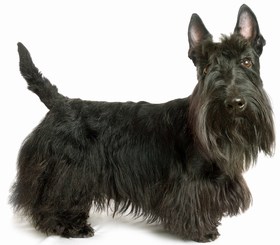 Scottish Terrier | 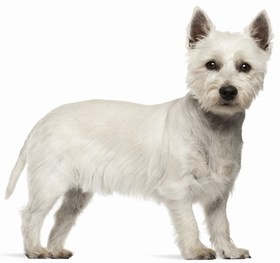 West Highland White Terrier | 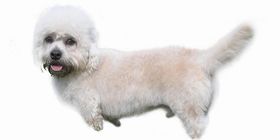 Dandie Dinmont Terrier | 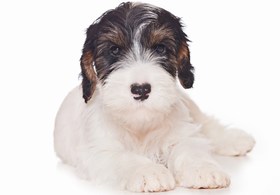 Sealyham Terrier |


